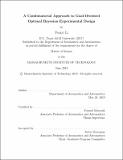| dc.contributor.advisor | Youssef Marzouk. | en_US |
| dc.contributor.author | Li, Fengyi(Computational scientist)Massachusetts Institute of Technology. | en_US |
| dc.contributor.other | Massachusetts Institute of Technology. Department of Aeronautics and Astronautics. | en_US |
| dc.date.accessioned | 2019-10-04T21:30:46Z | |
| dc.date.available | 2019-10-04T21:30:46Z | |
| dc.date.copyright | 2019 | en_US |
| dc.date.issued | 2019 | en_US |
| dc.identifier.uri | https://hdl.handle.net/1721.1/122376 | |
| dc.description | This electronic version was submitted by the student author. The certified thesis is available in the Institute Archives and Special Collections. | en_US |
| dc.description | Thesis: S.M., Massachusetts Institute of Technology, Department of Aeronautics and Astronautics, 2019 | en_US |
| dc.description | Cataloged from student-submitted PDF version of thesis. | en_US |
| dc.description | Includes bibliographical references (pages 83-87). | en_US |
| dc.description.abstract | Optimal experimental design plays an important role in science and engineering. In many situations, we have many observations but only few of them can be selected due to limited resources. We then need to decide which ones to select based on our goal. In this thesis, we study the Bayesian linear Gaussian model with a large number of observations, and propose several algorithms for solving the combinatorial problem of observation selection/optimal experimental design in a goal-oriented setting. Here, the quantity of interest (QoI) is not the model parameters, but some (vector-valued) function of the parameters. We wish to select a subset of the candidate observations that is most informative for this QoI, in the sense of reducing its uncertainty. More precisely, we seek to maximize the mutual information between the selected observations and the QoI. Finding the true optimum is NP-hard, and in this setting, the mutual information objective is in general not submodular. We thus introduce several algorithms that approximate the optimal solution, including a greedy approach, a minorize-maximize approach employing modular bounds, and certain score-based heuristics. We compare the computational cost these algorithms, and demonstrate their performance on a synthetic data set and a real data set from a climate model. | en_US |
| dc.description.sponsorship | Support from Department of Energy | en_US |
| dc.description.statementofresponsibility | by Fengyi Li. | en_US |
| dc.format.extent | 87 pages | en_US |
| dc.language.iso | eng | en_US |
| dc.publisher | Massachusetts Institute of Technology | en_US |
| dc.rights | MIT theses are protected by copyright. They may be viewed, downloaded, or printed from this source but further reproduction or distribution in any format is prohibited without written permission. | en_US |
| dc.rights.uri | http://dspace.mit.edu/handle/1721.1/7582 | en_US |
| dc.subject | Aeronautics and Astronautics. | en_US |
| dc.title | A combinatorial approach to goal-oriented optimal Bayesian experimental design | en_US |
| dc.type | Thesis | en_US |
| dc.description.degree | S.M. | en_US |
| dc.contributor.department | Massachusetts Institute of Technology. Department of Aeronautics and Astronautics | en_US |
| dc.identifier.oclc | 1119730930 | en_US |
| dc.description.collection | S.M. Massachusetts Institute of Technology, Department of Aeronautics and Astronautics | en_US |
| dspace.imported | 2019-10-04T21:30:44Z | en_US |
| mit.thesis.degree | Master | en_US |
| mit.thesis.department | Aero | en_US |
